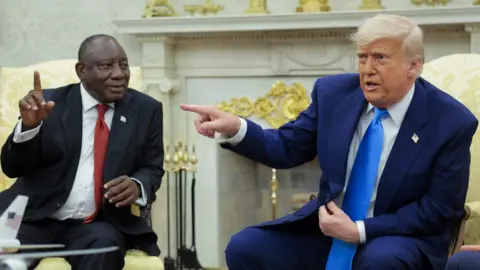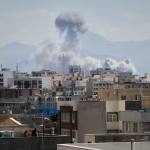In recent weeks, South Africa’s President Cyril Ramaphosa has found himself at the center of contrasting international and domestic narratives. While U.S. President Donald Trump publicly rebuked Ramaphosa, praising him at home and positioning him to potentially benefit from ongoing global tensions. This dichotomy underscores the complex geopolitical dynamics that influence South Africa’s leadership and its strategic positioning on the world stage.
Trump’s Rebuke and Its Context
During Donald Trump’s presidency (2017–2021), the U.S. sought to recalibrate its foreign policy, often emphasizing economic interests and strategic alliances. Trump’s approach to Africa, including South Africa, was characterized by skepticism toward multilateral institutions and a focus on bilateral economic deals. At times, Trump publicly criticized African leaders over issues such as governance, corruption, and economic policies.
While there is limited direct record of Trump explicitly rebuking Ramaphosa publicly, some reports suggest that during certain interactions, Trump expressed skepticism about South Africa’s policies or leadership. For instance, in 2018, Trump’s comments about African nations, including South Africa, were widely viewed as dismissive, and his administration placed sanctions and took a confrontational stance on issues like land reform and trade. Such comments and policies implicitly challenged Ramaphosa’s efforts to position South Africa as a stable, investor-friendly nation.
Domestic Praise and Political Capital
Back home, Ramaphosa has generally received praise from South African political circles and the public for his efforts to stabilize the country following the tumultuous presidency of Jacob Zuma. His administration has focused on anti-corruption measures, economic reforms, and restoring South Africa’s international image. Despite challenges such as sluggish economic growth, high unemployment, and ongoing corruption scandals, Ramaphosa remains a respected figure within South Africa’s ruling African National Congress (ANC) and among many citizens who see him as a stabilizing force.
The domestic praise has bolstered Ramaphosa’s legitimacy, allowing him to pursue reforms with a relatively strong mandate. His leadership has also been viewed positively in the context of regional stability and efforts to attract foreign investment, especially as South Africa seeks to recover from the economic fallout of the COVID-19 pandemic.
Potential Gains from US-China Geopolitical Tensions
A noteworthy aspect of Ramaphosa’s current international positioning is the potential to benefit from the ongoing strategic competition between the United States and China. As global powers vie for influence, South Africa’s strategic importance as a gateway to Africa and its resource-rich economy becomes increasingly significant.
With the U.S. increasingly scrutinizing China’s economic activities in Africa—particularly concerns over debt diplomacy and infrastructure projects—South Africa’s neutral stance and emphasis on economic diversification may position Ramaphosa to attract investment from both superpowers. The U.S.-China showdown has created opportunities for African nations to serve as strategic partners, leveraging diplomatic and economic ties to secure better terms and foster growth.
Additionally, Ramaphosa’s efforts to promote “quiet diplomacy” and maintain balanced relations with global powers could lead to enhanced diplomatic leverage. If managed skillfully, South Africa might attract more foreign direct investment, particularly in sectors like renewable energy, mining, and infrastructure, which are of interest to both the U.S. and China.
Conclusion
Cyril Ramaphosa’s international standing is shaped by a complex interplay of global geopolitics and domestic politics. While he has faced criticism and rebuke from figures like Donald Trump—either directly or indirectly—he continues to enjoy domestic praise for his stabilizing leadership. Furthermore, the ongoing U.S.-China rivalry provides strategic opportunities for South Africa under Ramaphosa’s leadership. By navigating these tensions carefully, Ramaphosa could potentially strengthen South Africa’s economic prospects and regional influence, turning international challenges into opportunities for growth and development.
Email Us on editorial@nnafrica.com













